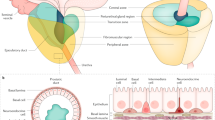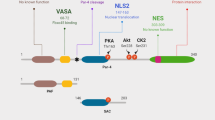Abstract
Despite the high incidence and mortality rate of prostate cancer, the molecular mechanisms underlying the progression of the disease remain to be fully elucidated. This paper reviews the current state of knowledge on prostatic carcinogenesis, focusing not only on the molecular genetics of prostate cancer, but also on the role of oncogenes, tumour suppressor genes, and growth factors. The remarkable ability of prostate cancer cells to survive androgen withdrawal and apoptosis are discussed, with particular emphasis on how apoptosis may be manipulated from a therapeutic viewpoint.
This is a preview of subscription content, access via your institution
Access options
Subscribe to this journal
Receive 4 print issues and online access
$259.00 per year
only $64.75 per issue
Buy this article
- Purchase on Springer Link
- Instant access to full article PDF
Prices may be subject to local taxes which are calculated during checkout
Similar content being viewed by others
Author information
Authors and Affiliations
Rights and permissions
About this article
Cite this article
Costa-Pereira, A., Cotter, T. Molecular and cellular biology of prostate cancer—the role of apoptosis as a target for therapy. Prostate Cancer Prostatic Dis 2, 126–139 (1999). https://doi.org/10.1038/sj.pcan.4500305
Received:
Revised:
Accepted:
Published:
Issue Date:
DOI: https://doi.org/10.1038/sj.pcan.4500305
Keywords
This article is cited by
-
Role of TRP ion channels in cancer and tumorigenesis
Seminars in Immunopathology (2016)



